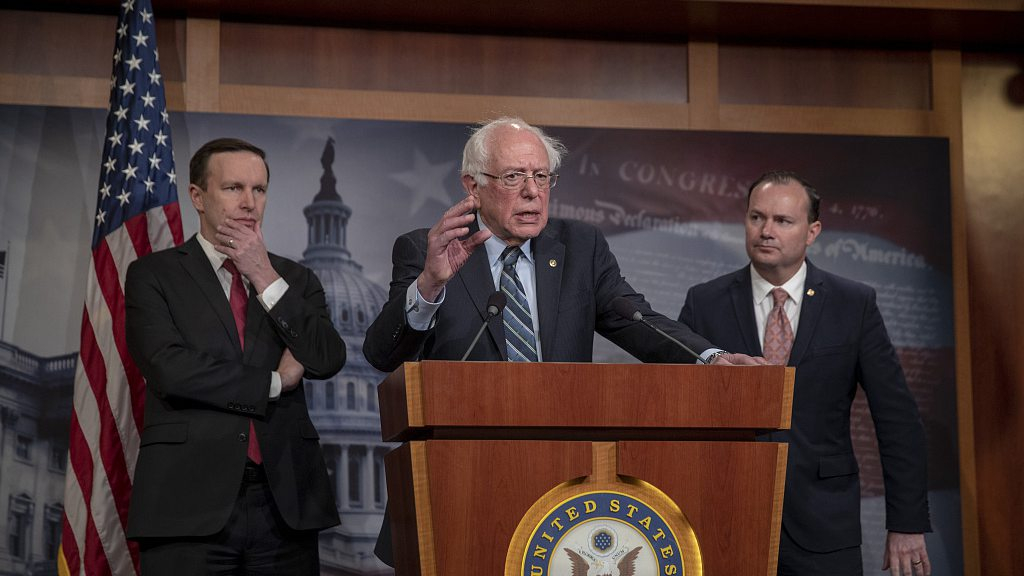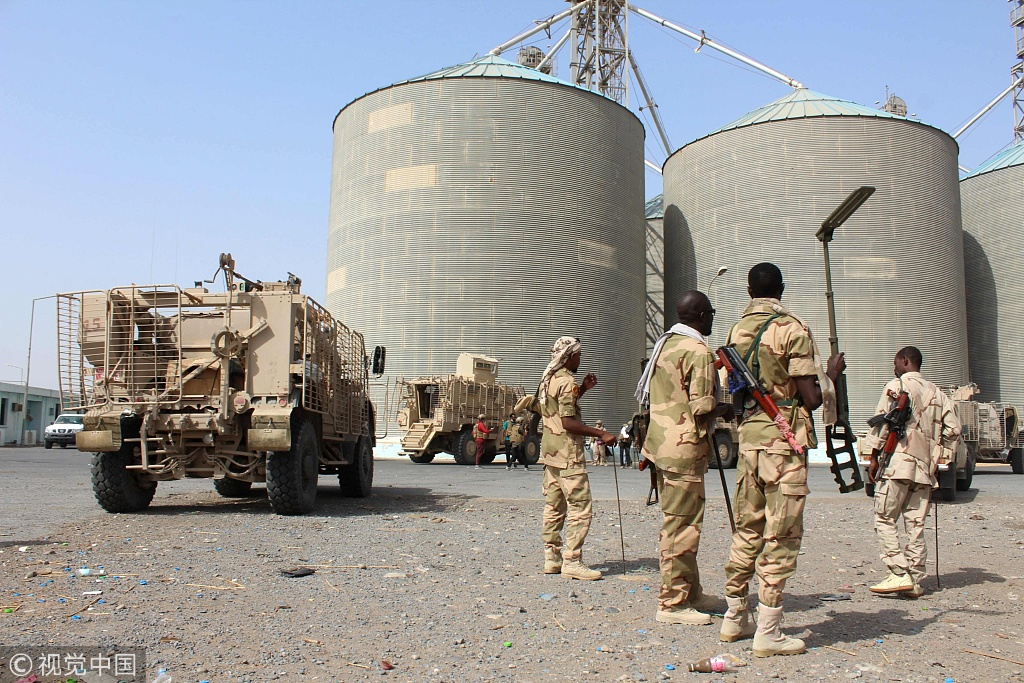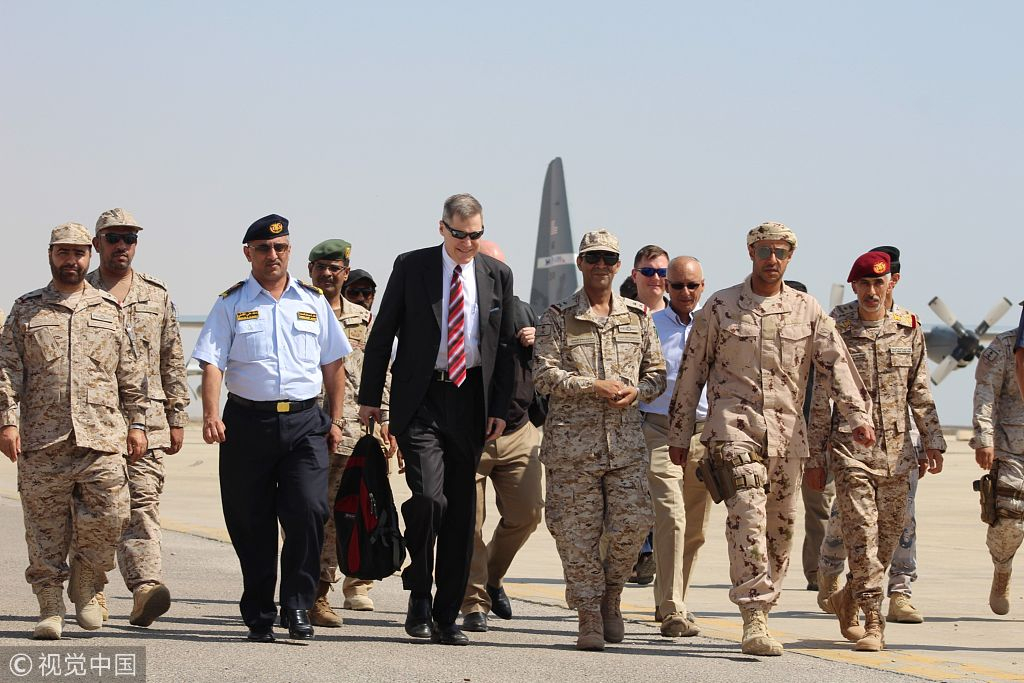
Opinion
18:54, 14-Mar-2019
Opinion: A historic chance to marshal Yemen reconstruction plan
Bobby Naderi

Editor's note: Bobby Naderi is a journalist, a current affairs commentator, a documentary filmmaker, and a member of the Writers Guild of Great Britain. The article reflects the author's opinions, and not necessarily the views of CGTN.
On March 13, the Senate voted to end U.S. support for the Saudi Arabian-led coalition's war in Yemen.
The unconscionable and unauthorized war has triggered a humanitarian catastrophe of biblical proportions, and the vote is a major step toward ending U.S. complicity in the world's worst humanitarian crisis. It equally puts pressure on Saudi Arabia and the United Arab Emirates (UAE) to change their tactics, negotiate an end to the conflict and work with the international civil society to rebuild the poorest country in the Arab world.
It's a historic opportunity for China, as well, to make this become a reality for the long-suffering people of Yemen. The world's second-biggest economy has what it takes to marshal international reconstruction efforts. The Asian giant played no role in the conflict, yet can surely help shape the post-conflict order, given the pre-war limitations of Yemen's infrastructure and construction, as well as the fact that if the U.S., Saudi Arabia and the United Arab Emirates (the main parties to the conflict) provide the bulk of the funds required for reconstruction, they will be tempted to politicize the distribution of these funds.
Although China has not taken a prominent leadership role, it has supported regional and international initiatives to mitigate the conflict, including the initiative of the Gulf Cooperation Council, the National Dialogue Conference and UN-led peace talks. As Yemen's major trade partner, China has an outsized economic presence in the country and can play a significant economic role in Yemen's postwar reconstruction through its Belt and Road Initiative.

Sudanese troops with a military coalition in Yemen backed by Saudi Arabia and the United Arab Emirates detect mines at a facility of the Red sea mills company in the Yemeni port city of Hodeida, January 22, 2019. /VCG Photo
Sudanese troops with a military coalition in Yemen backed by Saudi Arabia and the United Arab Emirates detect mines at a facility of the Red sea mills company in the Yemeni port city of Hodeida, January 22, 2019. /VCG Photo
This is important for regional peace and global stability, as according to the World Bank, around 44 percent of countries that have recently experienced civil strife return to war, in part because of failures to address economic grievances, international politics and regional rivalry. Yemen is not an exception, yet this can be prevented through restoring state legitimacy, and this can gain currency at the United Nations Security Council, too. The Council's permanent members (China, Russia, the U.S., UK and France) can address and rebuild state legitimacy if they don't take sides.
At any rate, the World Bank estimates that the potential cost of a reconstruction program is likely to be phenomenally high. The Bank says Yemen's reconstruction needs are around 30 billion U.S. dollars, of which almost 17 billion U.S. dollars would be needed for the first year of implementation.
This blueprint for reconstruction and recovery ties together the humanitarian response to the crisis with plans for governance capacity building and infrastructure funds. The World Bank has been conducting this work in cooperation with other multilateral organizations, including the United Nations Development Program and major donor nations including the U.S. and UK.
The only problem is that the profit-driven war machines of the U.S. and UK have played central roles in the conflict by providing weapons and military support to the Saudi-led coalition. Given their past behavior, their pledges read more like a wish list than a serious plan for reconstruction. Their attempts at planning for reconstruction and development will be heavily influenced by regional politics to contain Iran as well - Yemeni Houthis' ally. Unfortunately, it is hard to believe the U.S. and UK, as well as other war profiteers and greedy contractors, will ever prioritize, in the event of a mediated resolution to the conflict, rapid restoration of services and improvements in governance.

U.S. Ambassador to Yemen Matthew H Tueller (5th-L) arrives at Mukalla airport, southwestern Yemen, on November 29, 2018. /VCG Photo
U.S. Ambassador to Yemen Matthew H Tueller (5th-L) arrives at Mukalla airport, southwestern Yemen, on November 29, 2018. /VCG Photo
This is basic math and the numbers don't add up. It is also wishful thinking to assume that Saudi Arabia and the UAE will ever underwrite much of the cost of rebuilding what they have already destroyed in this four-year conflict. The deep involvement of both countries in the war and their anti-Iran policy and rhetoric are likely to remain a feature of the post-conflict reconstruction landscape. It is a sad statement that although they have pledged billions of dollars, the degree to which they have helped the humanitarian situation thus far remains largely vague, which does not bode well for their commitment to future reconstruction efforts.
To be clear, the same argument cannot be made against China and other responsible international actors. If they fund reconstruction, they won't politicize project implementation, or disrupt and centralize the supply of humanitarian aid, and/or indulge in debt-trap diplomacy. They will usher in peace for successful reconstruction planning, help produce notable benefits for the Yemeni population at large and ultimately shape the post-war order.
It is valuable then to conclude that only policies as such, and only primary donors and actors like China and other responsible members of the international community have the political will and the much-needed capital and technology to facilitate rebuilding Yemen's fractured infrastructure and economy, including its shattered energy sector. They have an eye - and interest - toward the future and the cessation of hostilities, including those that could help the economy and encourage foreign direct investment.
The plus point is that these countries are not looking for a temporary fix (cut and run) for a situation that calls for longer-term solutions. They want to frame reconstruction as a long-term effort to find a way to give people a steady income and hope for the future. This will include creating new opportunities in public sectors such as energy and infrastructure.
Speaking of energy, the export of energy products, which once accounted for about 25 percent of GDP and 65 percent of government revenue, has been largely suspended. China and other primary donors can help rebuild Yemen's energy infrastructure. If production of oil and gas can continue consistently, exporting would provide much-needed revenue to the central government, as well as help to pay off foreign debts and replenish the foreign currency reserves.
The timing of the U.S. Senate vote could not have come at a better time. It has moved the international civil society one step closer to ending this catastrophic war. This is a historic chance for China and other peace-loving nations to craft a comprehensive reconstruction plan at the United Nations that focuses on the priorities outlined above.
They should use their political influence to end the fighting in the Arab world's poorest country, and encourage international participation and investment in reconstruction efforts that are fair and equitable for the revitalization of the Yemeni infrastructure and economy as a whole. They should never allow politics and other manufactured non-realities to tear this new hope apart.
(Cover photo: Senator Bernie Sanders (D-VT) speaks about the bill to end the U.S. support for the war in Yemen in Washington, D.C., December 13, 2018. /VCG Photo)
(If you want to contribute and have specific expertise, please contact us at opinions@cgtn.com.)

SITEMAP
Copyright © 2018 CGTN. Beijing ICP prepared NO.16065310-3
Copyright © 2018 CGTN. Beijing ICP prepared NO.16065310-3